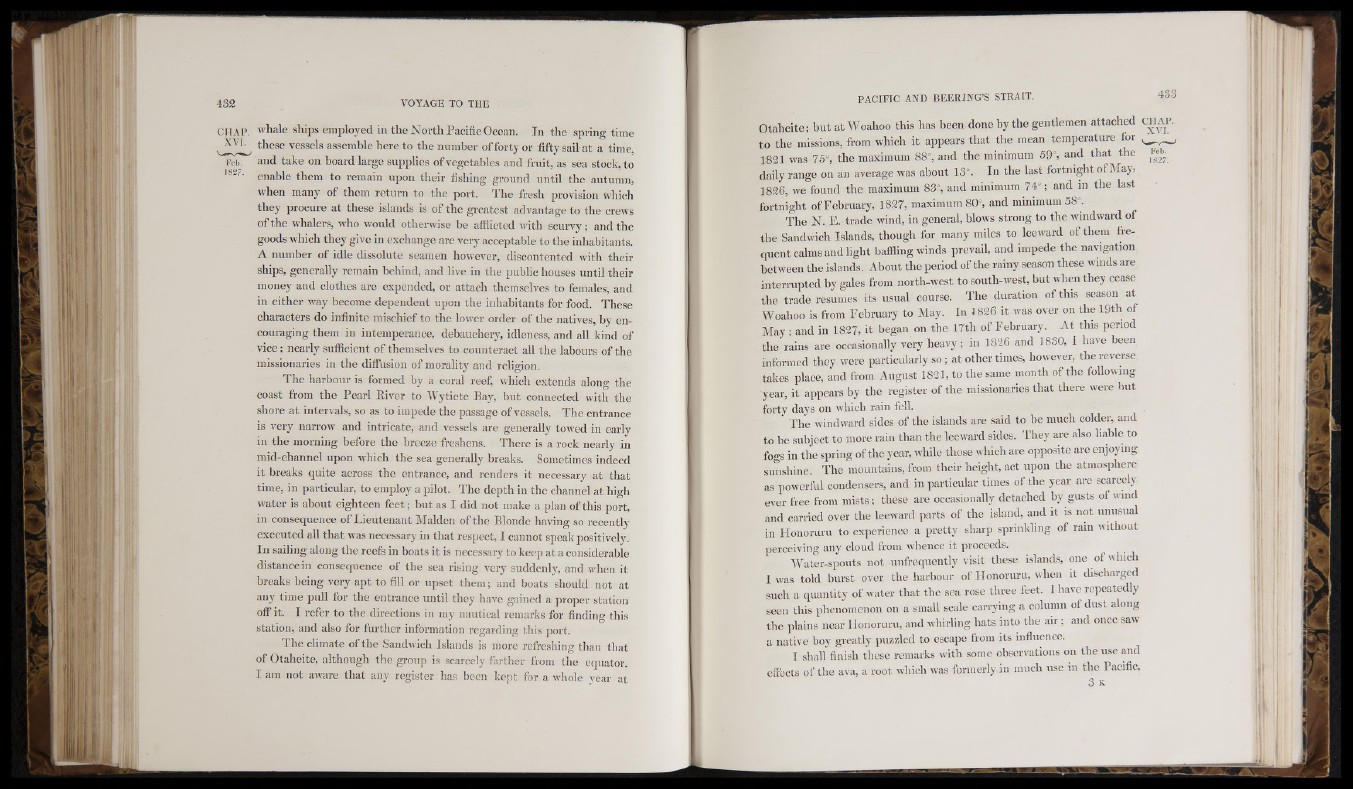
whale shijis employed in the North Pacific Ocean. In the springtime
these vessels assemble here to the number of forty or fifty sail at a time,
and take on board large supplies of vegetables and fruit, as sea stock, to
enable them to remain upon their fishing ground until the autumn,
when many of them return to the port. The fresh provision which
they procure at these islands is of the greatest advantage to the crews
of the whalers, who would otherwise be afflicted with scurvy; and the
goods which they give in exchange are very acceptable to the inhabitants.
A number of idle dissolute seamen however, discontented with their
ships, generally remain behind, and live in the public houses until their
money and clothes are expended, or attach themselves to females, and
in either }vay become dependent upon the inhabitants for food. These
characters do infinite mischief to the lower order of the natives, by encouraging
them in intemperance, debauchery, idleness, and all kind of
vice ; nearly sufficient of themselves to counteract all the labours of the
missionaries in the diffusion of morality and religion.
The harbour is formed by a coral reef, which extends along the
coast from the Pearl Eiver to Wytiete Bay, but connected with the
shore at intervals, so as to impede the passage of vessels. The entrance
is very narrow and intricate, and vessels are generally towed in early
in the morning before the breeze freshens. There is a rock nearly in
mid-channel upon which the sea generally breaks. Sometimes indeed
it breaks quite across the entrance, and renders it necessary at that
time, in particular, to employ a pilot. The depth in the channel at high
water is about eighteen fe e t; but as I did not make a plan of this port,
in consequence of Lieutenant Malden of the Blonde having so recently
executed all that was necessary in that respect, I cannot speak positively.
In sailing along the reefs in boats it is necessary to keep at a considerable
distancein consequence of the sea rising very suddenly, and when it
breaks being very apt to fill or upset them; and boats should not at
any time pull for the entrance until they have gained a proper station
off' it. I refer to the directions in my nautical remarks for finding this
station, and also for further information regarding this port.
The climate of the Sandvvich Islands is more refreshing than that
of Otaheite, although the group is scarcely farther from the equator.
I am not aware that any register has been kept for a whole vcar at
Otaheite; but at Woahoo this has been done by the gentlemen attached (
to the missions, from which it appears that the mean temperature for ^
1821 was 75”, the maximum 88", and the minimum 59% and that the
daily range on an average was about 13". In the last fortnight of May,
1826, we found the maximum 83", and minimum 74"; and in the last
fortnight of February, 1827, maximum 80", and minimum 58".
The N. E. trade wind, in general, blows strong to the windward of
the Sandwich Islands, though for many miles to leeward of them freq
u e n t calms and light baffling winds prevail, and impede the navigation
between the islands. About the period of the rainy season these winds are
interrupted by gales from north-west to south-west, but when they cease
the trade resumes its usual course. The duration of this season at
Woahoo is from February to May. In 3 826 it was over on the 19th of
May; and in 1827, it began on the 17th of February. At this period
the rains are occasionally very heavy; in 1826 and 1830, I have been
informed they were particularly so ; at other times, however, the reverse
takes place, and from August 1821, to the same month of the following
year, it appears by the register of the missionaries that there were but
forty days on which rain fell.
The ■windward sides of the islands are said to be much colder, and
to be subject to more rain than the leeward sides. They are also liable to
fogs in the spring of the year, while those which are opposite are enjoying
sunshine. The mountains, from their height, act upon the atmosphere
as powerful condensers, and in particular times of the year are scarcely
ever free from mists; these are occasionally detached by gusts of wind
and carried over the leeward parts of the island, and it is not unusual
in Honoruru to experience a pretty sharp sprinkling of rain without
perceiving any cloud from whence it proceeds.
Watcr-spouts not unfrequently visit these islands, one ot which
I was told burst over the harbour of Honoruru, when it discharged
such a (luantity of water that the sea rose three feet. 1 have repeatedly
seeii this phenomenon on a smalt scale carrying a column of dust along
the plains near Honoruru, and whirling hats into the air : and once saw
a native boy greatly puzzled to escape from its influence.
I shall finish these remarks with some observations on the use and
effects of the ava, a root which was formerly in much use iu the Pacific,
3 K